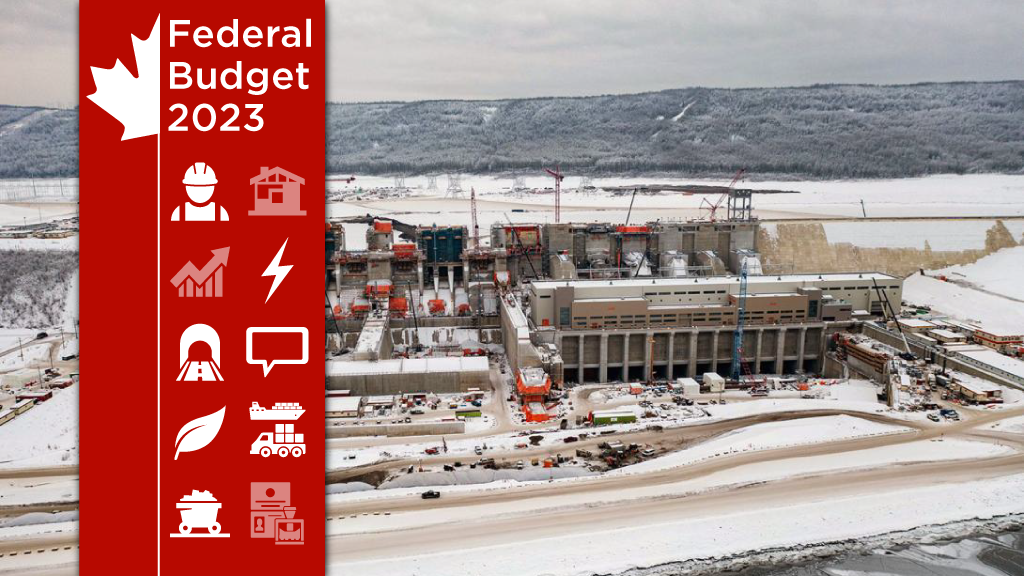Investments in clean, green energy in Canada’s 2023 budget are welcome by western construction leaders but most decry the lack of a national infrastructure strategy for trade.
“There’s an appropriate focus on the clean energy economy and as construction employers we are keen to be a part of that,” said Paul de Jong, president of the Progressive Contractors Association of Canada.
But while a focus on green is always welcome, de Jong fears the country is not putting in the necessary work to ensure transitions away from traditional industries have minimal negative impacts.
“There’s no sort of balancing approach to the traditional natural resource sector, which has been the home base for so many construction workers across the labour spectrum for many decades,” de Jong said.
And the rhetoric around the transition needs to be backed up by policy and action.
“The presumption that we’ve heard from this government prior to this budget is that all the workers who have grown up in the traditional natural resource sector are going to naturally find jobs in this emerging clean marketplace.
“But that’s not a proven point. To put all the eggs into the clean energy basket is really a misplaced exercise in balancing.”
De Jong said robust policy that helps workers in slowing industries find jobs is a necessity and that his association and the industry at large are ready to consult on making that happen.
But they aren’t getting invited to the table.
“The consultations have been slim to none,” he said.
Similarly, Chris Lorenc, president of the Manitoba Heavy Construction Association, said his organization judges budgets on three pillars: socially progressive policy, environmental responsibility and economic growth.
He said the Liberal budget gets good marks on the first two pillars but receives a failing grade on economic growth.
He emphasized the fact Canada is a major trading power on the world stage, but that status has been diminished in the past decade and needs a concerted and well-funded effort to bring it back.
“I found in the budget documents a glimmer of hope that perhaps Budget 2024/25 will usher in a priority on investment in economic growth,” Lorenc said.
He is referencing page 75 of the budget, which states the federal government’s intent to work with industry and area governments to create a National Supply Chain Strategy with a focus on trade corridor investments.
But the words are not backed up by any meaningful financial or policy commitments.
He noted a $52 million multi-year investment into Transport Canada is paltry and does little to address the most important infrastructure.
“There’s the infrastructure we want, like parks and splash pads and recreation; there’s the infrastructure we need, like health care and education; but then there’s the infrastructure that pays for it all and that’s trade,” Lorenc said, paraphrasing the Perrin Beatty of the chamber of commerce.
“We are by definition a trade-based economy.”
While investments into a critical mineral strategy is important to keep Canada a dominant trading partner, Lorenc said more needs to be done to make our trade corridors more capable than ever before.
Chris Atchison, president of the British Columbia Construction Association, lauded investments in green infrastructure and tax incentives related to green building projects.
But “there’s not a lot in this budget that’s going to make a significant difference for B.C.’s construction industry,” Atchison said.
He expressed disappointment in a lack of action to address housing affordability and enable housing projects to be completed faster.
Atchison, de Jong and Lorenc all agreed on one thing: Canada needs a national infrastructure plan.
“We stand by the fact that we need a long-term infrastructure plan so that we can address some of this nation’s aging infrastructure.”
Atchison was also pleased with intentions to increase immigration into Canada but said the government needs to change policy, so it is as easy for immigrants with valuable skilled trades to get into the country as for people with college degrees and large bank accounts.
Budget 2023 “falls a bit short in providing the right conditions to secure economic growth and stability for all Canadians through concrete action on workforce capacity building, fair procurement and trade-enabling infrastructure investment,” he said.
Matt MacInnis, president of the Electrical Contractors Association of B.C., said investments into electrical projects are interesting but worries about how the industry in B.C. will be able to use them.
“British Columbia will need to make some adjustments to its recent policy if firms operating in B.C. are going to be able to take advantage of those dollars,” MacInnis said.
MacInnis, while touting the importance of mega hydro projects like the Site C Dam, said there needs to be a framework in place to ensure smaller energy projects can fill the gaps as reliance on electricity grows.
“The reality is you’re not going to build a new major dam in British Columbia in the next eight years,” he said. “Any electricity grid needs to have a diversified mix of projects.
“And I think that British Columbians are open to the idea of having new solar projects or wind farms or run-of-the-river projects being built to supplement and complement the incredible firm power which BC Hydro is able to provide.”









Recent Comments